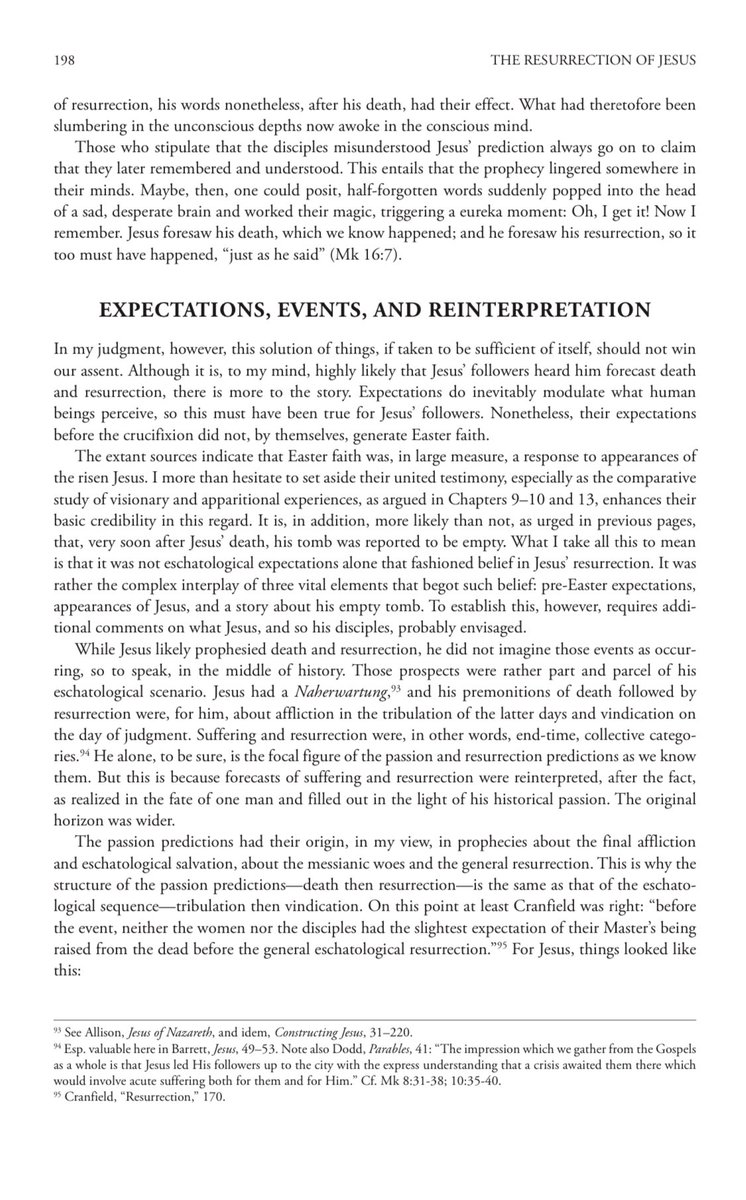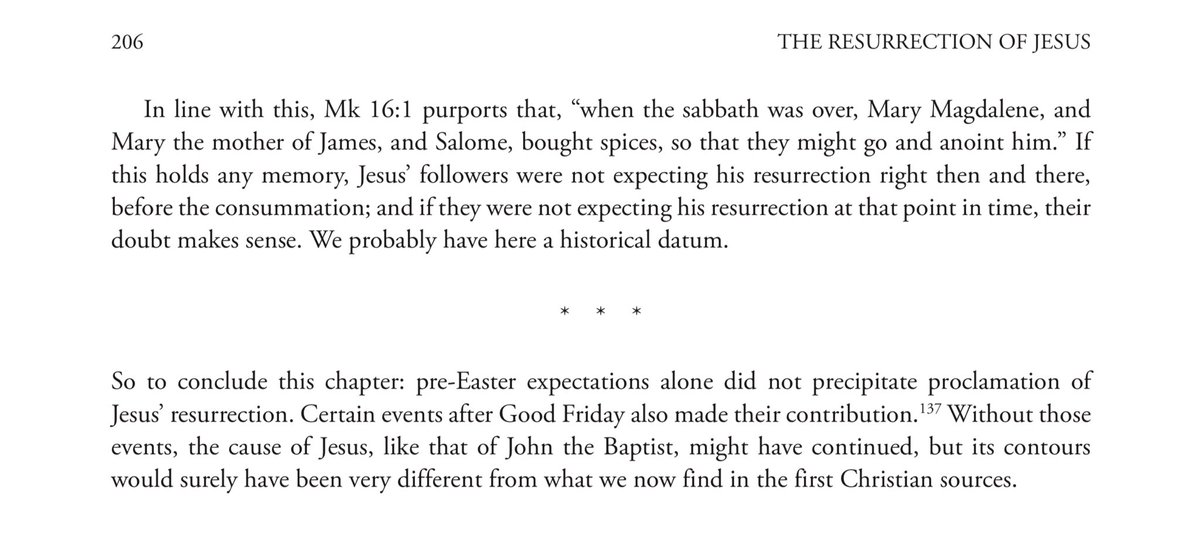
#Thread Several naturalistic explanations have long been proposed for the resurrection of Jesus. One in particular that has been frequently discussed, especially on social media, is cognitive dissonance.
Essentially, the cognitive dissonance explanation states that Jesus’ followers had totally committed themselves to the belief that when he arrived in Jerusalem he would establish himself as messiah and usher in the eschatological Kingdom of God.
When Jesus was instead arrested and brutally crucified, the cold reality of his death powerfully disconfirmed their strongly held beliefs. The crucifixion, in other words, plunged Jesus’ followers into a state of cognitive dissonance.
Cognitive dissonance theory (CDT) states that when two strongly held cognitions are dissonant (ex: they absolutely believed Jesus was going to redeem Israel & there is no doubt that he died), people will be impelled to take steps to reduce dissonance between the two cognitions.
This presumably led his followers to creatively reinterpret or rationalize their messianic expectations. They began to proclaim that Jesus’ had actually died for our sins and that God had raised him from the dead and that now he was exalted to the right hand of God.
We have seen similar reinterpretation of prophetic failure among groups such as the Millerites, Jehovah’s Witnesses, Lubavitchers, Seventh Day Adventists, etc. So why wouldn’t we expect this sort of dissonance reduction to occur among the followers of Jesus? Simple enough…right?
This is important… For cognitive dissonance to work as an explanation for the resurrection, the death of Jesus had to cut against the expectations of his followers in such a way as to cause a state of psychological dissonance. See Hugh Jackson (1975): journals.uchicago.edu/doi/10.1086/48…
If this is not the case, then the cognitive dissonance explanation falls apart like a house of cards. So let’s test it…
To test cognitive dissonance as an explanation for the resurrection belief, we need to pose an important historical question… What did Jesus’ followers most likely expect to happen in Jerusalem?
Throughout our earliest sources, we see a recurrently attested pattern… Jesus predicted/anticipated his soon to come violent death and shared this prediction with his followers. ⬇️ 

In no way does anyone need to presume supernatural ability when suggesting that Jesus “predicted” his own death. This could conceivably have been done by reading the circumstances around him, including the recent violent death of John the Baptist.
The textual attestation we have makes it more probable than not that Jesus’ passion predictions were in fact historical. See Michael Patrick Barber’s piece in the Journal for the Study of the Historical Jesus (2020): brill.com/downloadpdf/jo…
So if (as evidenced by our sources) the followers of Jesus were expecting his violent death in Jerusalem, then his death, although traumatizing, would not produce the dissonant cognitions required to make cognitive dissonance an effective explanation for the resurrection belief.
As Dale Allison has said, “A martyr's fate agreed perfectly with what Jesus had predicted, so in that particular there was no cognitive dissonance to surmount” (The Resurrection of Jesus, 202)
Let’s play devil’s advocate 😉 for a moment… Even IF the followers of Jesus experienced cognitive dissonance upon his crucifixion, it’s no guarantee that they would have therefore moved to maintain their belief in the face of disconfirmation through a process of rationalization.
For while we certainly have examples of religious movements that did so, there are perhaps even more examples of religious groups that abandoned their beliefs (or lost membership) in the face of disconfirmation.
Rodney Stark was correct in his judgment, “Other things being equal, failed prophesies are harmful for religious movements.” Journal of Contemporary Religion: Vol 11, No 2 (137)
Simply put… The historical (and even the sociological) evidence we have cuts against the appeal to cognitive dissonance as an explanation for the resurrection belief among Jesus’ followers.
Ironically, we see that the appeal to cognitive dissonance as an explanation for the resurrection belief has itself been disconfirmed by the cold hard realities of history. So then why hasn’t this explanation simply been abandoned?
Far be it from me to presume upon the psychological motivations of those who promote the cognitive dissonance explanation, but I’ve noticed what seems to be an emotional commitment to the explanation. What the nature of that attachment might be I’ll leave to others to decide…
Doubtless, some cognitive dissonance apologists may reply to or quote tweet this thread with attempts to salvage the explanation. And they may indeed bring up some valid points to consider…
They may complain that I just “misunderstand”how cognitive dissonance theory (CDT) is being applied in this case. That may be. I’ve heard this complaint before, but have yet to hear a clear explanation of what it is that I don’t understand.
However, my suspicion is that (again ironically) their emotional commitment to the explanation, even in the face of its disconfirmation, will lead to attempts at rationalization.
Examples: “Here’s why the explanation still works…” (despite being disconfirmed historically) or “This is why we should disregard all of the passion predictions…” (despite the abundant textual attestation).
So does CDT have anything to offer the study of Christian origins? Absolutely! It’s a valuable (albeit imperfect) sociological tool. I do truly think CDT can shine some light on the early Jesus movement.
Jesus’ original followers and successive generations do seem to have experienced cognitive dissonance.
History reveals however that it wasn’t the crucifixion that was the cause of dissonance among Jesus’ followers, rather it was the resurrection event (whatever the exact nature of it was) itself that caused extraordinary dissonance.
This new understanding that Jesus had been raised from the dead in a special resurrection *prior* to the general resurrection AND now needed to be exalted in ways previously reserved only for God, within a monotheistic 1st C Jewish world, must have led to unimaginable dissonance.
Whatever they experienced was so shocking that it forced them to reinterpret/reorient their beliefs in order to better accord with this new experience. We see the motif of surprise at the resurrection also being attested throughout our sources.
Since the concept of “resurrection” in 1st C Judaism was understood as the general resurrection at the end of the world, Jesus’ resurrection was interpreted as a special resurrection, the “first fruits” from the dead. The end of this world must therefore be very near at hand.
As the first century drew to a close and the much anticipated end never arrived (causing further dissonance), Christians began to contemplate the idea that God had other plans for the movement.
Maybe God wasn’t ushering in the end of the world…but instead bringing about the birth of something new in the world.
So yes… CDT does help us better understand Christian origins, but not in the way that cognitive dissonance apologists want (or need?) it to.
Here’s Dale Allison, in The End of the Ages Has Come (164-5), explaining much more eloquently than I ever could, why cognitive dissonance doesn’t work as an explanation for the earliest belief in the resurrection. ⬇️ 



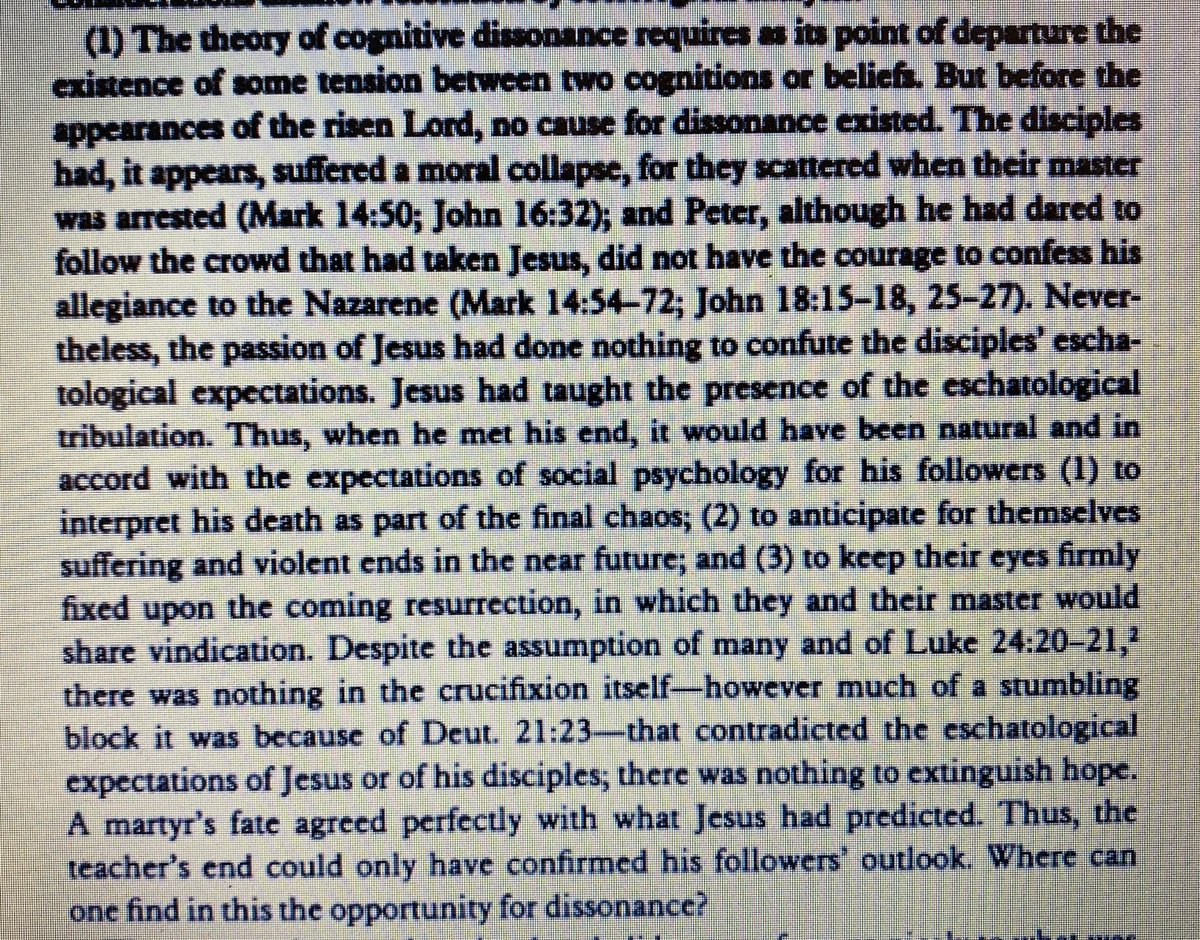
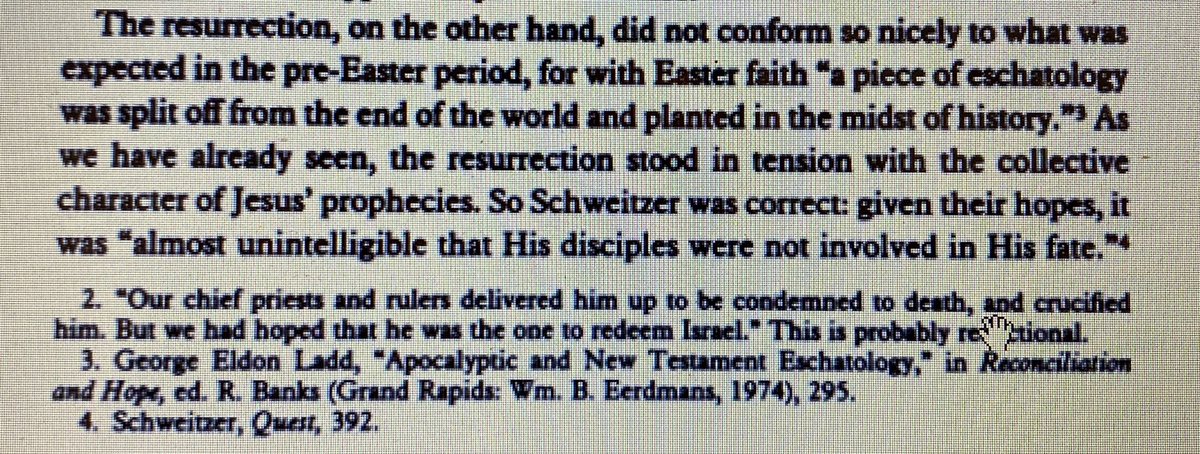
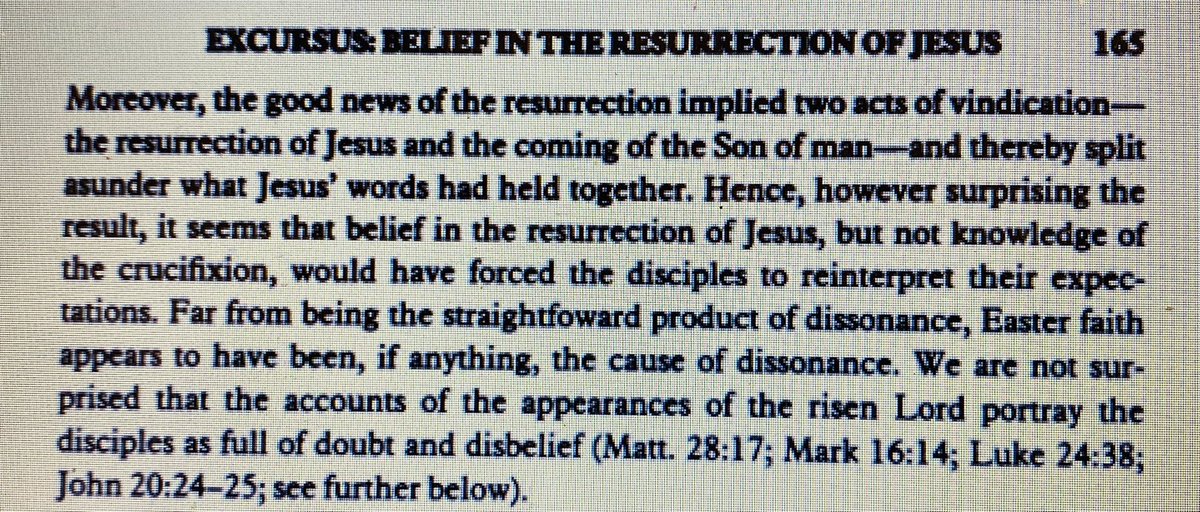
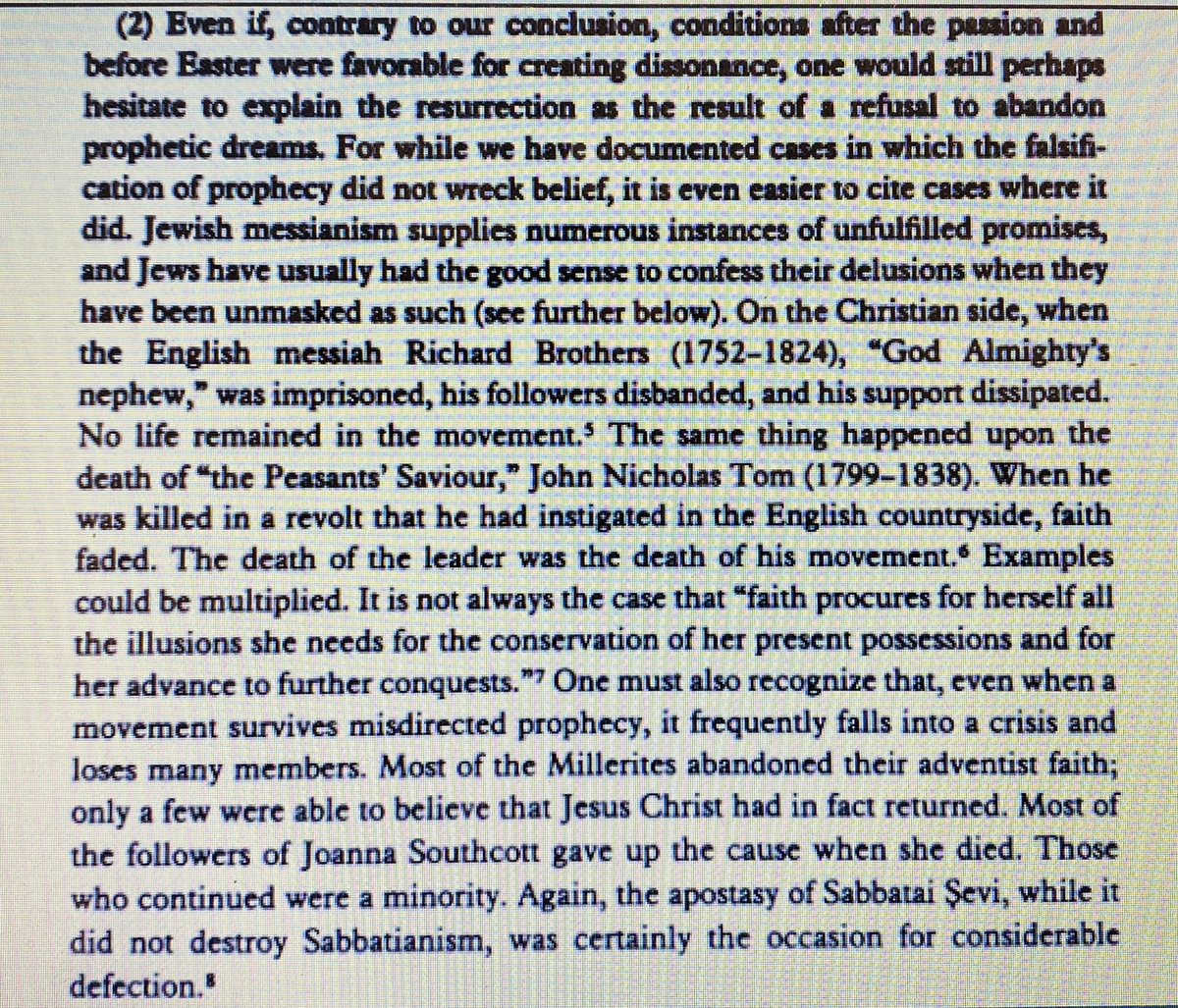
He makes similar arguments in his other works, including his most recent, The Resurrection of Jesus, 201-203). ⬇️ 


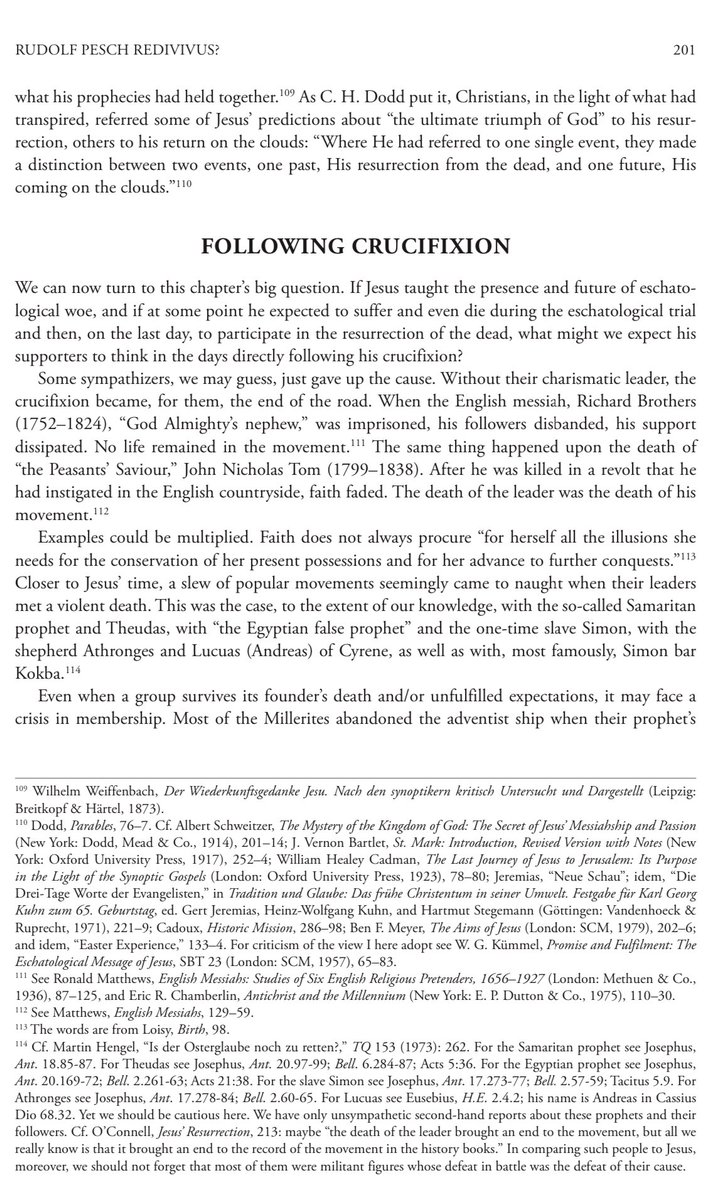
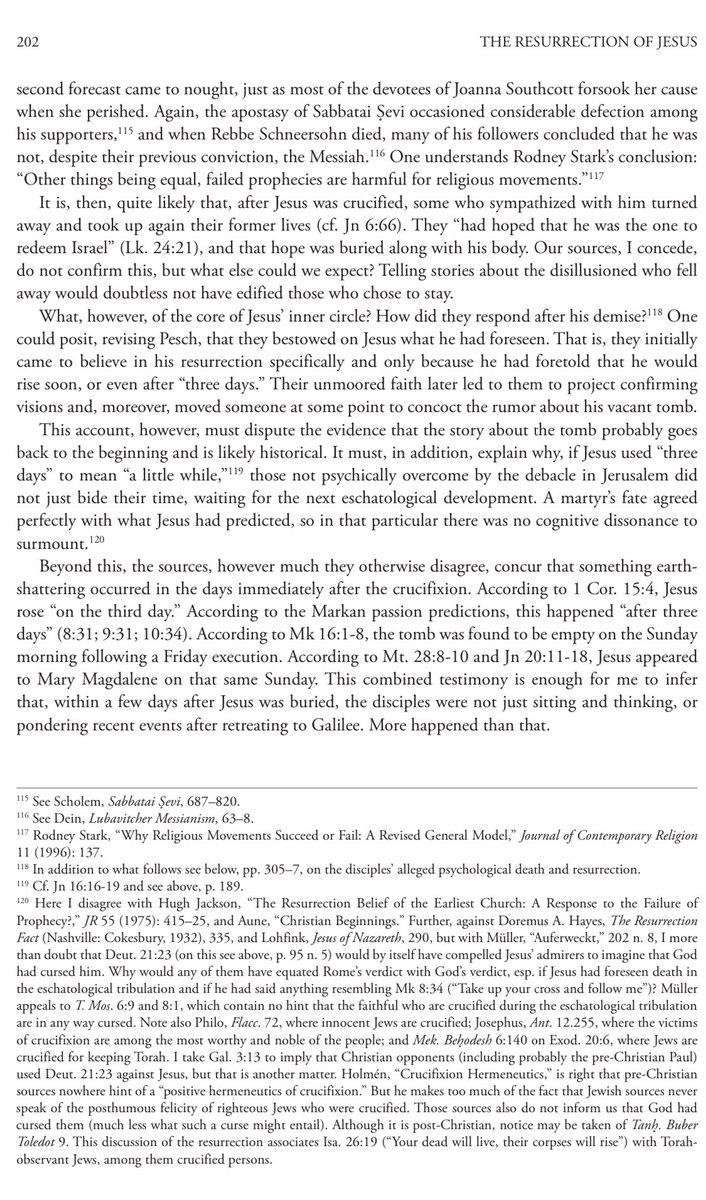
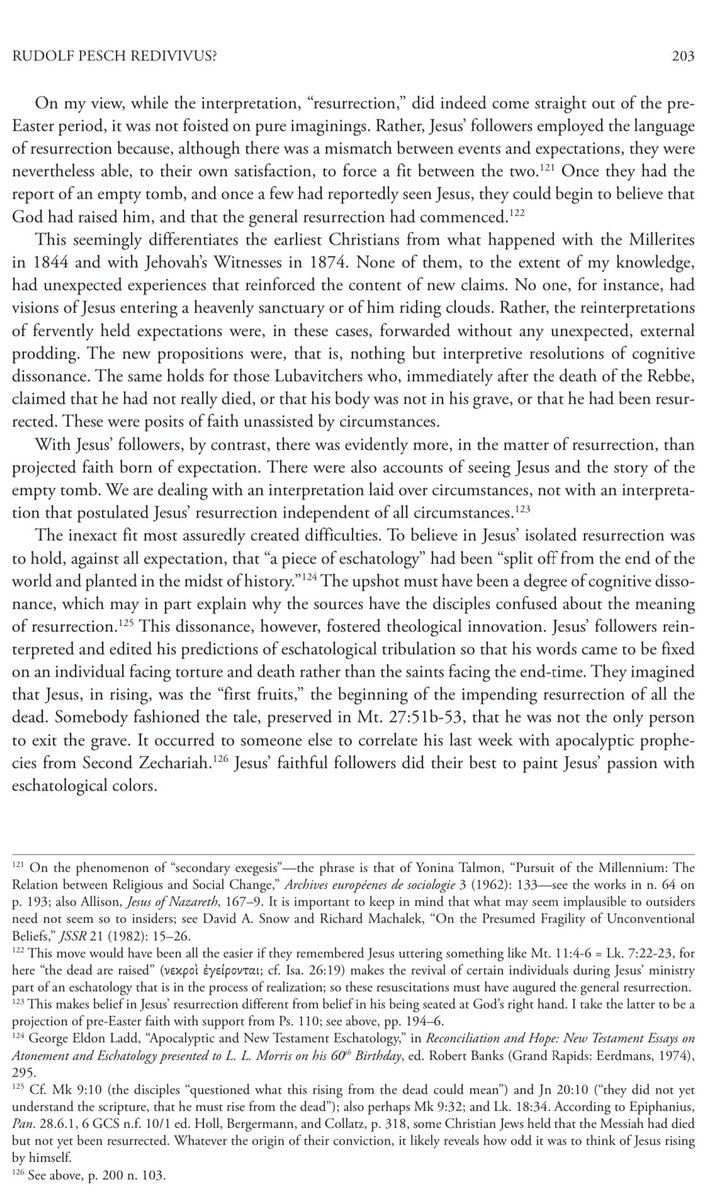
• • •
Missing some Tweet in this thread? You can try to
force a refresh


